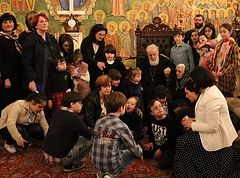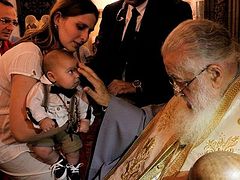Tbilisi, April 11, 2018
In his Paschal epistle, His Holiness Catholicos-Patriarch Ilia II of Georgia pointed to the country’s need to create an “anti-abortion attitude” and to supply help from the state for families with many children, reports News-Georgia.
The Georgian Church is seriously concerned about the demographic situation in the country. Clergy regularly speak about the need for active measures for improving the situation, and many openly advocate for the prohibition of abortion at the legislative level.
“According to experts, the population decreased by 28% in a short time, which brought severe consequences for our small nation. It seems to me that in order to at least partially correct this extreme situation, we must create an anti-abortion attitude, as the gravest of sins, and in the first stage to develop a separate law for families with many children, to take steps to help them,” reads the patriarch’s Paschal message.
The patriarch also noted that he is speaking not only of ethnic Georgian families, but of all who live in the country, including Abkhazians, Udins, Kistins, Ossetians, Assyrians, and so on.
His Holiness also specified that he believes legislative measures could be introduced for families with four or more children and that support should be determined based on the number of children.
His Holiness began his own initiative in 2008 in which he baptizes and becomes the godfather to every third and higher child of parents who were married in the Church. 708 children were baptized in the 52nd mass Baptism on January 21, bringing the patriarch’s number of Godchildren to 33,934.
“Families should feel that the state cares for them and is grateful to them for their sacrifices,” Pat. Ilia stated.
Note that the Georgian parliament is currently considering legislation under which families with four or more children would be considered large families and would be able to enjoy special benefits.
To date, the Georgian state provides assistance to mothers at the birth of their third and subsequent child in regions with low birth rates. The mother receives 150 lari (more than $62) per month until the child reaches two. In mountainous regions the amount is 200 lari (about $84).




